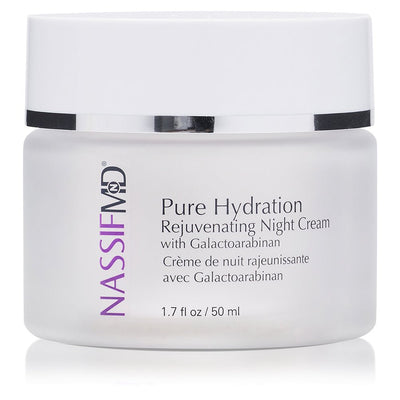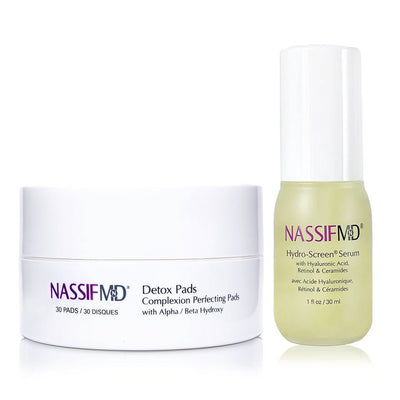Skincare Essentials: Wear Sunscreen in Winter (and Every Other Season)
Wearing sunscreen in winter is essential for skin health and preventing premature aging. When the weather turns cool, keep sunscreen as part of your daily skincare routine. Not convinced? Keep reading to learn why you need it and the best sunscreen options for your face.
This article will cover:
- Should you wear sunscreen every day, even in the winter?
- The benefits of sunscreen during winter
- The risks of not wearing sunscreen
- When to apply sunscreen
- Mineral vs chemical sunscreen
- The best mineral sunscreens for your face
Do You Really Need Sunscreen in Winter?
In the winter, you’re still exposed to UV radiation from the sun. Because of the positioning of the earth, there are fewer UVB rays in the winter (associated with vitamin D production) and even more of the deep-penetrating UVA rays.
Even when it’s cold and you bundle up to go outside in winter clothing, UV radiation penetrates exposed areas of the skin, like your face, lips, hands, back of the neck, and ears.
Sunburn in winter is still common, especially without door activities where the snow reflects sunlight and at higher elevations where you experience stronger rays.
Additionally, indoors, you’re still exposed to UV radiation through windows. If a plant could grow where you’re sitting, you probably need sunscreen.
What are the Benefits of Wearing Sunscreen Every Day?
Regular sunscreen use is linked to many skin health benefits, from a reduced risk of skin cancer to slowing the aging process. You must wear sunscreen daily to get the most benefit.
Reduced Risk of Skin Cancer
Skin damage caused by sun exposure is the leading cause of skin cancer. Most skin cancers are preventable by limiting sun exposure, wearing protective clothing, and using SPF sunscreen year-round.
Sun protection is even more critical for those with sun-sensitive skin. Caucasians get skin cancer at a rate 25 times higher than persons of color and six times more than Hispanics. However, all races can get skin cancer and benefit from sunscreen use.
Protects from Sunburns
You may not think about sunburn in winter, but spending a day skiing, snowshoeing, or outdoors can result in a severe sunburn. Not only will your skin get UV rays directly from the sun, but the rays are also reflected by the snow, causing sunburn to exposed areas like the face. You may be even more susceptible to sunburn if your skin is dry or chapped already. Winter sunblock protects from sunburn.
Prevents Photoaging
Photoaging is a skin process triggered by sun exposure, leading to changes in pigment, skin thickness, elasticity, and collagen degradation. In short, your skin ages faster. Photoaging skin is also associated with skin cancer.
Sun Exposure and Premature Aging
When considering photoaging vs. normal aging, everybody’s skin ages and will eventually show wrinkles, sagging, loss of elasticity, and other signs of aging. But sun exposure accelerates the process. One study calculates that UV exposure from the sun accounts for 80% of visible facial aging! Wear SPF to slow photoaging.
Hydrates Skin
Sun-protected skin is hydrated skin. Sun damages all skin layers, particularly the outermost epidermis layer, which is responsible for skin barrier function. When the skin barrier is compromised, more water evaporates from the skin, leading to dry skin. From this perspective, SPF sunscreen is critical for keeping skin hydrated and moisturized.
Read more about skin hydration in A Facial Plastic Surgeon Explains How to Hydrate Your Skin for a Youthful, Healthy Appearance.
Promotes Smooth and Even Complexion
UV rays affect skin pigmentation, and damaged areas often result in hyperpigmentation, like sunspots or age spots. By preventing sun damage, sunscreen promotes a smooth and even complexion.
What Happens if You Don’t Wear Sunscreen Daily?
If you don’t wear sunscreen, photoaging occurs and, over time, impairs the structure and function of your skin. It may lead to cosmetic changes, including signs of aging, and an increased risk for dry skin, skin conditions, and even cancer.
Sunspots
Sunspots, sometimes called age spots or liver spots, are areas of the skin that turn dark because of sun exposure. They are flat and noncancerous, but many people seek dermatologic or medical spa treatments to remove them.
Premature Aging
Skipping your daily sunscreen leads to premature aging, which can look like fine lines, wrinkles, sunspots, crepey skin, dryness, and other unwanted changes. The good news is that implementing sunscreen in your routine can prevent further aging and possibly reverse the signs of already present photodamage.
Skin Ailments
Sun damage may increase your risk for more serious skin diseases or ailments, including:
- Skin lesions
- Rashes
- Skin hypersensitivity
- Skin autoimmunity
- Actinic keratosis – precancerous thick, crusty areas
- Skin cancer
Scarring
If you have a scar from a previous injury or surgery, the scarred skin is more susceptible to the sun’s damage. Sun exposure can prevent a scar from healing, even leading to more pronounced and darker scars.
Discolored Skin
Sun damage leads to changes in pigmentation, like sunspots and freckles, redness, blotchiness, and other discoloration. Sometimes the changes are temporary, as with a mild sunburn, but discolored skin can also become permanent.
What Should You Put on Before Sunscreen?
When it comes to sunscreen, the most important tip is to use it consistently. When using other skincare products, the order of application can help improve the SPF effectiveness.
Apply Sunscreen Last in Your Skincare Routine
As a rule, apply sunscreen as the last step of your morning skincare routine. Allow sunscreen to absorb and dry fully before applying makeup.
Don’t forget to reapply facial sunscreen throughout the day as needed and choose an SPF lotion for your body.
Apply Serums and Moisturizers First
Since you apply sunscreen last, layer face serums and moisturizers on first. Serums can provide concentrated antioxidants that penetrate the skin, offering protection from sun damage. It’s not always necessary to have a separate moisturizer and SPF product. Choosing a moisturizer with SPF can help you streamline your skincare routine.
Mineral vs. Chemical Sunscreen – What’s the Difference?
Is sunscreen good for your skin? From the perspective of preventing sun damage and aging, sunscreen is good for your skin. But not all sunscreens are created equal. Some sunscreens contain chemicals that raise concerns for human and environmental health. Many sunscreen chemicals have been banned in specific countries but remain widely available globally.
Is mineral sunscreen better? Mineral-based sunscreens offer an effective alternative to chemical options. Minerals like zinc and titanium physically block the sun’s rays and provide a high safety profile.
Dr. Nassif’s Suite of SPF Lotions and Lip Balm
Sunscreen is one of the most essential skincare products you’ll ever use. NassifMD® facial plastic surgeon skincare offers mineral sunscreens and SPF lip balm to protect your face, even in the winter months.
SPF15 Hydrating Lip Balm
NassifMD® SPF15 Hydrating Lip Balm provides sunflower, jojoba, and mango oils and SPF protection to hydrate, nourish, and protect the lips. If you have dry, chapped lips in the winter or spend time outdoors, this lip balm is a must. Keep one in your pocket to reapply as needed.
Protect and Hydrate
NassifMD® Protect & Hydrate Daily Mineral Sunscreen is the best mineral sunscreen and moisturizer combination with a universal tint for all skin tones. It combines SPF 44 from zinc oxide and titanium dioxide with hyaluronic acid and vitamin E for the ultimate moisturizing sunscreen experience. It’s lightweight, waterproof, and perfect for winter and all year round.
Simply Hydration
For an un-tinted mineral sunscreen, try NassifMD® Simply Hydration Sheer Daily Sunscreen. This face lotion with SPF 40 contains vitamin E, plant antioxidants, and hyaluronic acid with mineral protection from zinc oxide. The combination of sunscreen plus antiaging ingredients is a win-win for any time of year.
Because it’s winter doesn’t mean you can relax on sunscreen. Work to make sunscreen a daily habit for the ultimate skin protection. NassifMD® Skincare makes sticking to your routine easy and enjoyable. Your future skin will thank you.
References:
- Watson, M., Holman, D. M., & Maguire-Eisen, M. (2016). Ultraviolet Radiation Exposure and Its Impact on Skin Cancer Risk.Seminars in oncology nursing, 32(3), 241–254.
- Guan, L. L., Lim, H. W., & Mohammad, T. F. (2021). Sunscreens and Photoaging: A Review of Current Literature.American journal of clinical dermatology, 22(6), 819–828.
- Flament, F., Bazin, R., Laquieze, S., Rubert, V., Simonpietri, E., & Piot, B. (2013). Effect of the sun on visible clinical signs of aging in Caucasian skin.Clinical, cosmetic and investigational dermatology, 6, 221–232.
- Ho, C. Y., & Dreesen, O. (2021). Faces of cellular senescence in skin aging.Mechanisms of ageing and development, 198, 111525.
- Randhawa, M., Wang, S., Leyden, J. J., Cula, G. O., Pagnoni, A., & Southall, M. D. (2016). Daily Use of a Facial Broad Spectrum Sunscreen Over One-Year Significantly Improves Clinical Evaluation of Photoaging.Dermatologic surgery : official publication for American Society for Dermatologic Surgery [et al.], 42(12), 1354–1361.
- Merin, K. A., Shaji, M., & Kameswaran, R. (2022). A Review on Sun Exposure and Skin Diseases.Indian journal of dermatology, 67(5), 625.
- Suh, S., Pham, C., Smith, J., & Mesinkovska, N. A. (2020). The banned sunscreen ingredients and their impact on human health: a systematic review.International journal of dermatology, 59(9), 1033–1042.






















